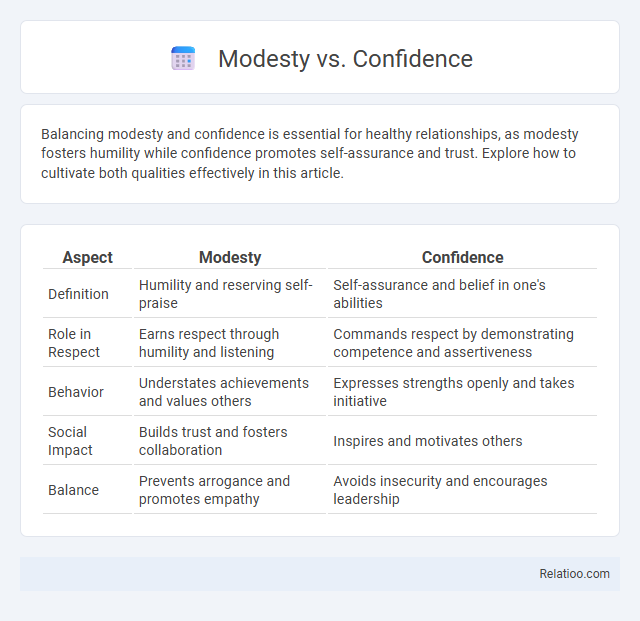Balancing modesty and confidence is essential for healthy relationships, as modesty fosters humility while confidence promotes self-assurance and trust. Explore how to cultivate both qualities effectively in this article.
Table of Comparison
| Aspect | Modesty | Confidence |
|---|---|---|
| Definition | Humility and reserving self-praise | Self-assurance and belief in one's abilities |
| Role in Respect | Earns respect through humility and listening | Commands respect by demonstrating competence and assertiveness |
| Behavior | Understates achievements and values others | Expresses strengths openly and takes initiative |
| Social Impact | Builds trust and fosters collaboration | Inspires and motivates others |
| Balance | Prevents arrogance and promotes empathy | Avoids insecurity and encourages leadership |
Understanding Modesty: Definition and Core Values
Modesty is defined by humility, simplicity, and restraint in behavior and appearance, emphasizing self-awareness without arrogance. Core values of modesty include respect for others, emotional balance, and prioritizing inner qualities over external validation. Understanding modesty requires recognizing its role in fostering positive social interactions and maintaining authentic self-expression without seeking undue attention.
Unpacking Confidence: Meaning and Importance
Confidence represents a belief in one's abilities and decision-making, fostering resilience and proactive behavior essential for personal and professional growth. It contrasts with modesty, which emphasizes humility and restraint in self-presentation, helping balance arrogance and social harmony. Developing confidence enhances communication, leadership qualities, and overall self-efficacy, making it a critical attribute for success and well-being.
The Cultural Perspectives on Modesty and Confidence
Cultural perspectives on modesty and confidence vary significantly, shaping how individuals express self-presentation and interpersonal behavior. In Western societies, confidence is often celebrated as a sign of individuality and leadership, while modesty may be perceived as humility or lack of assertiveness. Conversely, many Eastern cultures prioritize modesty as a virtue that fosters social harmony and respect, viewing overt confidence as potentially disruptive or disrespectful.
Modesty vs Confidence: Key Differences
Modesty and confidence differ fundamentally in how you perceive and present yourself; modesty involves humility and restraint, avoiding exaggeration of abilities, while confidence reflects a strong belief in your skills and qualities. Modesty tends to foster approachability and respect, emphasizing collective success over individual praise, whereas confidence drives assertiveness and leadership by highlighting your strengths. Understanding these key differences helps balance personal humility with self-assuredness, enhancing social interactions and personal growth.
The Balance: When Modesty Supports Confidence
Striking the right balance between modesty and confidence enhances personal credibility and fosters authentic self-expression. Modesty supports confidence by grounding boldness in humility, which helps build trust and respect in social and professional interactions. Embracing modesty prevents overconfidence, allowing individuals to remain open to growth while showcasing their strengths effectively.
Common Misconceptions About Modesty and Confidence
Many people mistakenly equate modesty with a lack of confidence, assuming that being humble means undervaluing your own abilities. In reality, true modesty involves recognizing your strengths without arrogance, while confidence is the assured belief in your skills and worth. You can balance modesty and confidence by respecting your achievements without the need for excessive self-promotion, dispelling the myth that modesty means insecurity or weakness.
The Role of Modesty and Confidence in Personal Development
Modesty and confidence play crucial roles in personal development by balancing self-awareness and self-assurance, fostering growth without arrogance. Modesty encourages humility and openness to learning, while confidence drives initiative and resilience in overcoming challenges. Together, these traits cultivate emotional intelligence and improve interpersonal relationships, essential for achieving long-term success.
Impact on Relationships: Modesty vs Confidence
Confidence fosters open communication and trust in relationships, enabling partners to express needs and set boundaries effectively. Modesty promotes humility and respect, preventing arrogance and encouraging empathy between individuals. Balancing confidence with modesty enhances relationship dynamics by combining self-assurance with consideration, leading to healthier interactions and mutual understanding.
Navigating Modesty and Confidence in the Workplace
Navigating modesty and confidence in the workplace requires balancing humility with self-assurance to effectively showcase your skills without appearing arrogant. Demonstrating confidence through clear communication and decisive actions helps establish credibility, while modesty fosters collaboration and openness to feedback. Your ability to blend these traits enhances professional relationships and supports career growth.
Building Authentic Self-Esteem: Integrating Both Traits
Building authentic self-esteem involves balancing confidence with modesty to create a genuine self-perception. Confidence empowers you to acknowledge your strengths and take on challenges, while modesty fosters humility and openness to growth. Integrating both traits cultivates a resilient and grounded identity, enhancing personal and social relationships.

Infographic: Modesty vs Confidence
 relatioo.com
relatioo.com